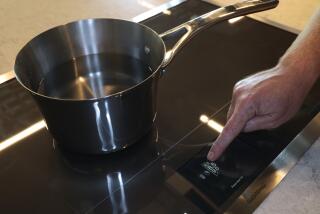Newer Water Heaters Save Money, Energy
- Share via
Question: Our gas water heater is 15 years old. With two teenage daughters, we often run out of hot water in the morning. Will we save much gas with a new water heater and what are the important features to consider?
Answer: You will realize a substantial savings on your gas bills by switching to one of the newest high-efficiency water heaters (up to $100 annually depending on your gas rates). Hot water output is also greater, so the last one up in the morning will not get stuck with a cold shower.
For people with electric water heaters, there are new models that allow simple conversion to gas (or propane). If natural gas is available in your area, the annual savings can be several hundred dollars. There are outdoor, power-vent or direct-vent models that do not require chimneys.
Although gas water heaters appear to be simple devices with no moving parts and they all look alike, there are actually many design differences under the white sheet-metal skin. The design of the flue baffling, anode rods, insulation levels and dip tube design all affect life and efficiency.
To be sure that you get one with enough hot water for the morning, consider the first hour rating. This includes the gallons of hot water in the tank plus the amount of incoming cold water that the burners can heat in one hour. Definitely select one with a higher rating than your old one.
Another item to consider is the energy factor, which indicates the overall operating expense and efficiency of the water heater. The best ones are above 0.6. Don’t be fooled by quoted high “combustion efficiency” figures. They do not take into account tank wall and other losses.
The tank and other parts warranty is another good indication of quality. The highest for residential gas water heaters is 12 years. Ten years is typical for most high-quality models and six years for standard ones.
Tank-wall insulation thickness determines the heat loss from the tank. The models with an energy factor above 0.6 use 2-inch-thick foam insulation. Average models with 1 inch of foam insulation are still better than your old one.
Dual corrosion-reducing anode rods are good for areas with particularly corrosive water. Built-in heat trap water fittings at the tank top can reduce energy loss when no hot water is being used. Look for a sediment-reducing dip tube design that swirls the water.
A new safety feature on some gas water heaters is called Flame Guard. If combustible vapors (chemical cleaners, solvents, etc.) are drawn into the water heater burner and ignite, a special thermal switch and burner air inlet design keeps the flames inside to stop a fire or explosion in the room.
Write for (or instantly download at https://www.dulley.com) Update Bulletin No. 749, a buyer’s guide to the most efficient gas water heaters, ratings, insulation, warranty and sizing work sheet. Please include $3 and a business-size self-addressed stamped envelope and mail to James Dulley, Los Angeles Times, 6906 Royalgreen Drive, Cincinnati, OH 45244.
Foggy Windows Aren’t a Do-It-Yourself Fix
Q: Our replacement thermal windows are about 5 years old and two of them have fog between the panes. Is there anything that I can do myself to permanently clear out the moisture between them?
A: I have heard of people fixing the window panes themselves, but I would not recommend it for safety reasons. You are better off having the panes replaced. If they are only 5 years old, the warranty may cover it.
To fix them yourself, you must first separate the panes. The glass may break, with obvious hazards. An acid bath may be needed to clean off the fog film. The desiccant material must be dried and then the panes resealed.
*
James Dulley has written a 208-page book, “Earth Friendly Home,” which include buyers’ guides to 460 manufacturers of alternative energy products, 21 low-cost conservation projects and 10 landscaping plans. You can order this book for $13.95 (includes delivery) with check payable to James Dulley. Mail to James Dulley, Earth Books, P.O. Box 54987, Cincinnati, OH 45254.
More to Read
Inside the business of entertainment
The Wide Shot brings you news, analysis and insights on everything from streaming wars to production — and what it all means for the future.
You may occasionally receive promotional content from the Los Angeles Times.










